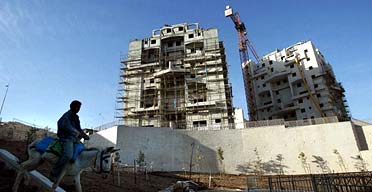
In 1978, when the Palestinian lawyer Rajah Shehadeh returned to his native Ramallah in the West Bank after studying in London, he found solace in walking the hills, admiring the stone walls and wild flowers - and trying not to think about the Israeli settlements sprouting like mushrooms after spring rain. It was not easy to ignore them, especially as his professional life centred on fighting land expropriation orders issued by the occupation authorities.
Back then, the 1967 war - when Israeli forces conquered the West Bank, east Jerusalem and the Gaza Strip (as well as the Egyptian Sinai and Syria's Golan Heights) - was still a fairly recent memory. Now, 40 years on, Shehadeh has written a book about Palestinian walks that is a poignant reminder of what has happened. Its subtitle - Notes on a Vanishing Landscape - succinctly captures the essence of his story.
This is a personal take on a depressingly familiar theme. The wadis are choked with wild cyclamen, thyme and asphodels. As he wanders, Shehadeh passes olive groves and fruit trees, encounters gazelles and goats as well as bare rock and its evidence of dramatic geological change over millennia. But, as one West Bank hilltop after another is claimed by the Israelis (Palestinians built their villages along the contours of the hills), and yet more settlements are established, the familiar view changes beyond recognition.
"It was as though the tectonic movements that had occurred over thousands of years were now happening in a matter of months, entirely redrawing the map," Shehadeh writes. "The Palestine I knew, the land I thought of as mine, was quickly being transformed before my eyes."
Shehadeh, the author of several other acclaimed (and more optimistic) memoirs, has not produced a guidebook to rambling and hiking in the Holy Land: there are no routes up mountains or recommendations of cosy pubs in lonely valleys, no sketches of the stone shelters built by farmers to store their crops or shelter their sheep. But, like the poet Mahmoud Darwish, he conjures up something of what has been lost, and is still being lost, to the Palestinians - and what that means.
Tellingly, the Arabic word "sarha" - a walk or roam - derives from the verb used for cattle grazing freely on pasture. Shehadeh's musings as he anxiously negotiates the changing landscape - isolated Palestinian enclaves, Israeli checkpoints and an ever-expanding network of settler-only bypass roads, and finally the "separation wall" - give new meaning to the "right to roam" that most in the west rightly take for granted.
This being Palestine, nature and politics are inseparable. Part of Shehadeh's purpose is to counter the Zionist tradition of "knowing the land" - knowledge in the service of establishing a patrimony dating back 3,000 years to biblical times. His writing mirrors the work of the Israeli dove Meron Benvenisti, another lover of the countryside, its lore and its placenames, who has long despaired of finding a workable political solution to the conflict.
Shehadeh dwells on the "cruel paradox" in the Zionist image of Judea and Samaria (the Hebrew names for the West Bank). "The very thing that renders the landscape 'biblical', its traditional habitation and cultivation in terraces, olive orchards, stone building and the presence of livestock, is produced by the Palestinians, whom the Jewish settlers came to replace. And yet the people who ... render the landscape biblical are themselves excluded from the panorama. The Palestinians are there to produce the scenery and then disappear."
Ma'aleh Adumim, the sprawling mega-settlement that now extends from east Jerusalem half way to Jericho, all but bisecting the West Bank, could hardly fit in less with the environment - "Milton Keynes transported into the landscape of a mediaeval Italian fresco," in the words of one foreign visitor. In 1980 Ariel Sharon, then Israel's defence minister, promised "a new map of the country". He kept his word.
Rajah Shehadeh loves his walks but his mood is profoundly bleak. Once he was pleased the Israeli authorities were designating certain areas as nature reserves but changed his mind when they were closed to Palestinians after the Oslo self-rule agreement in 1993 - a catastrophic error in his eyes (not least because the number of settlers has doubled since then). And Israel's concerns for the environment look less benign when raw sewage from Jewish settlements pours untreated onto the land of Palestinian farmers.
Like others on both sides of the Middle East divide, this articulate and thoughtful man recognises the psychological damage ordinary people are suffering, admitting to his own "internalised defeat" as the defiant old slogan of "sumoud" (steadfastness) gives way to a sense of helplessness (as much in the face of the corruption of the Palestinian Authority as the injustices of the Israeli occupation).
And as a lawyer he is bitter that his belief in legality proved no defence to what seems the irreversible loss of so much of his land, his personal struggle a dismal failure. On his final walk near Ramallah, Shehadeh meets a young, armed Israeli settler who grew up in and loves the same hills as him. He finds, unsurprisingly, that their respective versions of their right to be where they are bluntly irreconcilable. Lost for words, the enemies share a nargileh (water pipe) of hashish by a babbling brook: anywhere else this might symbolise hope of a better, united future. I felt it meant that the sober reality of Palestine-Israel was simply too harsh to bear.
· Palestinian Walks: Notes on a Vanishing Landscape by Raja Shehadeh, published by Profile books

